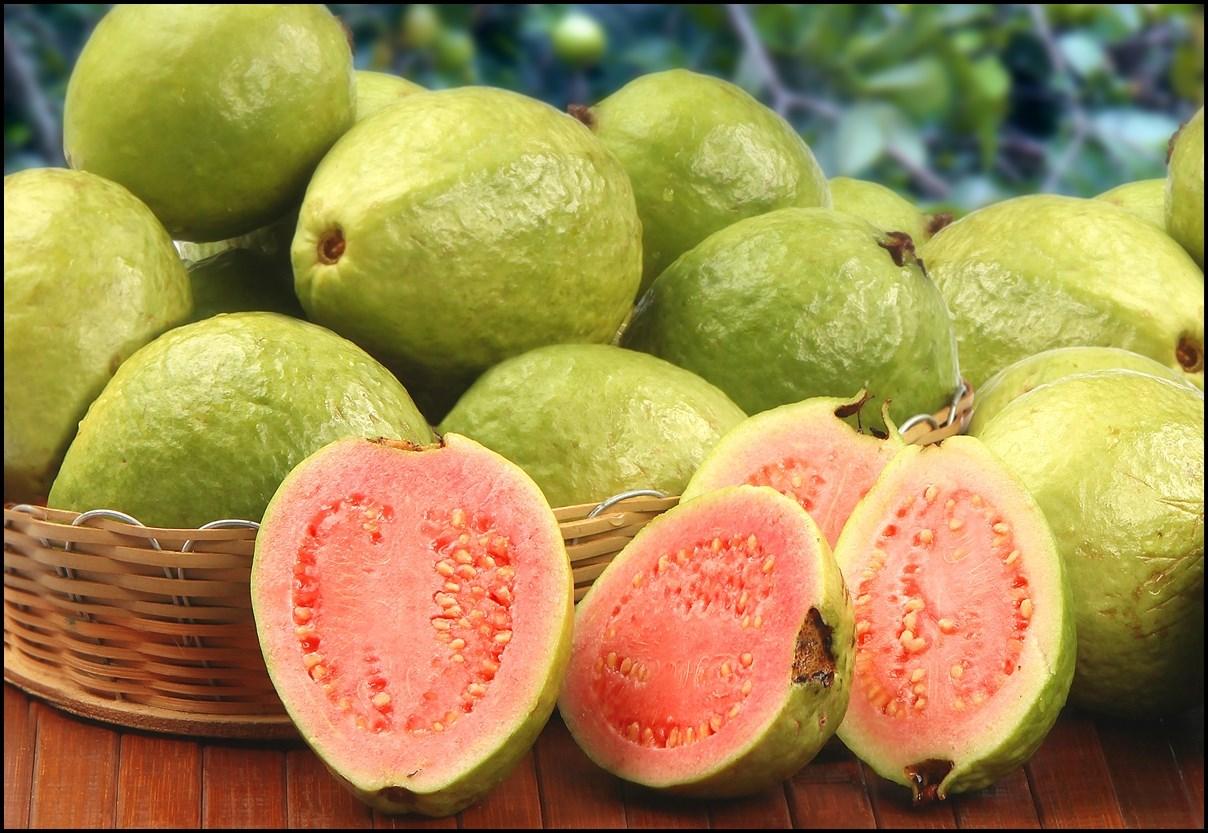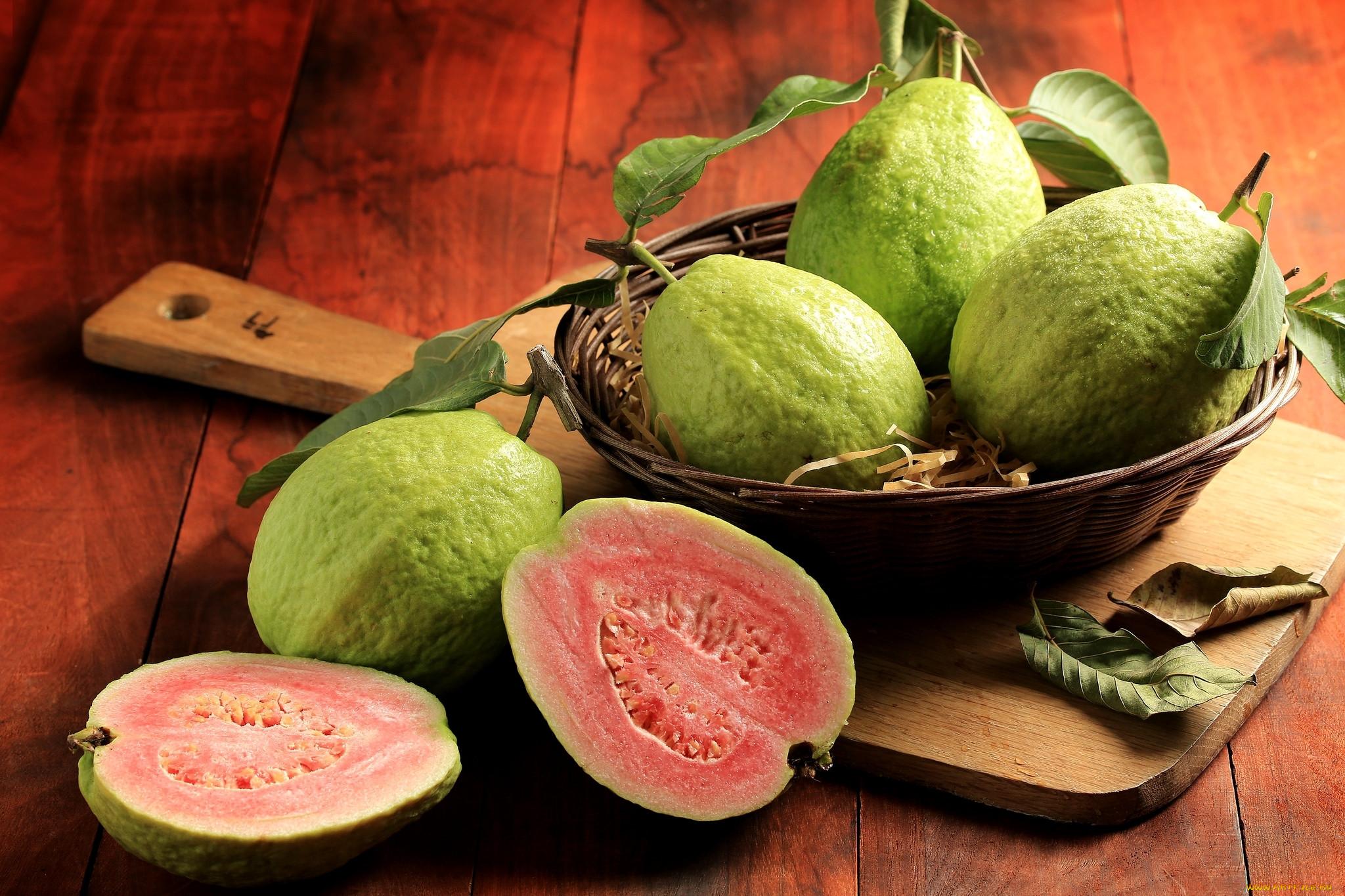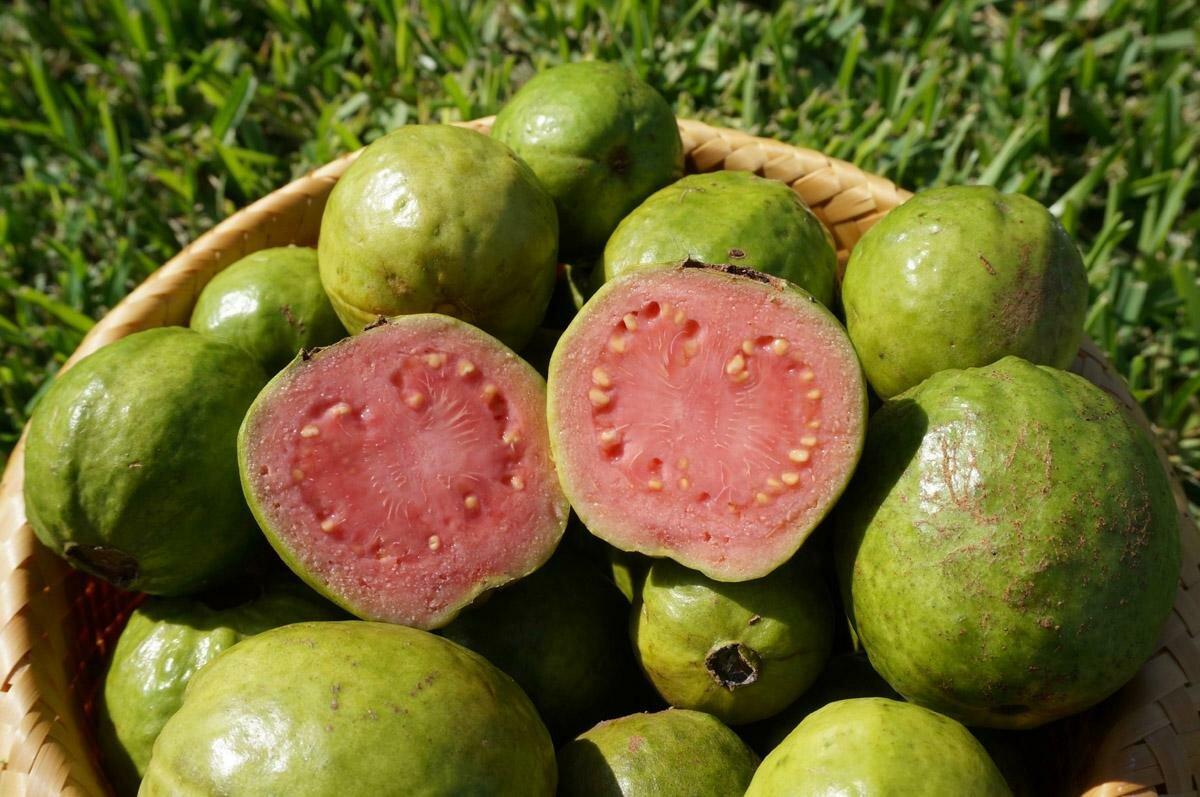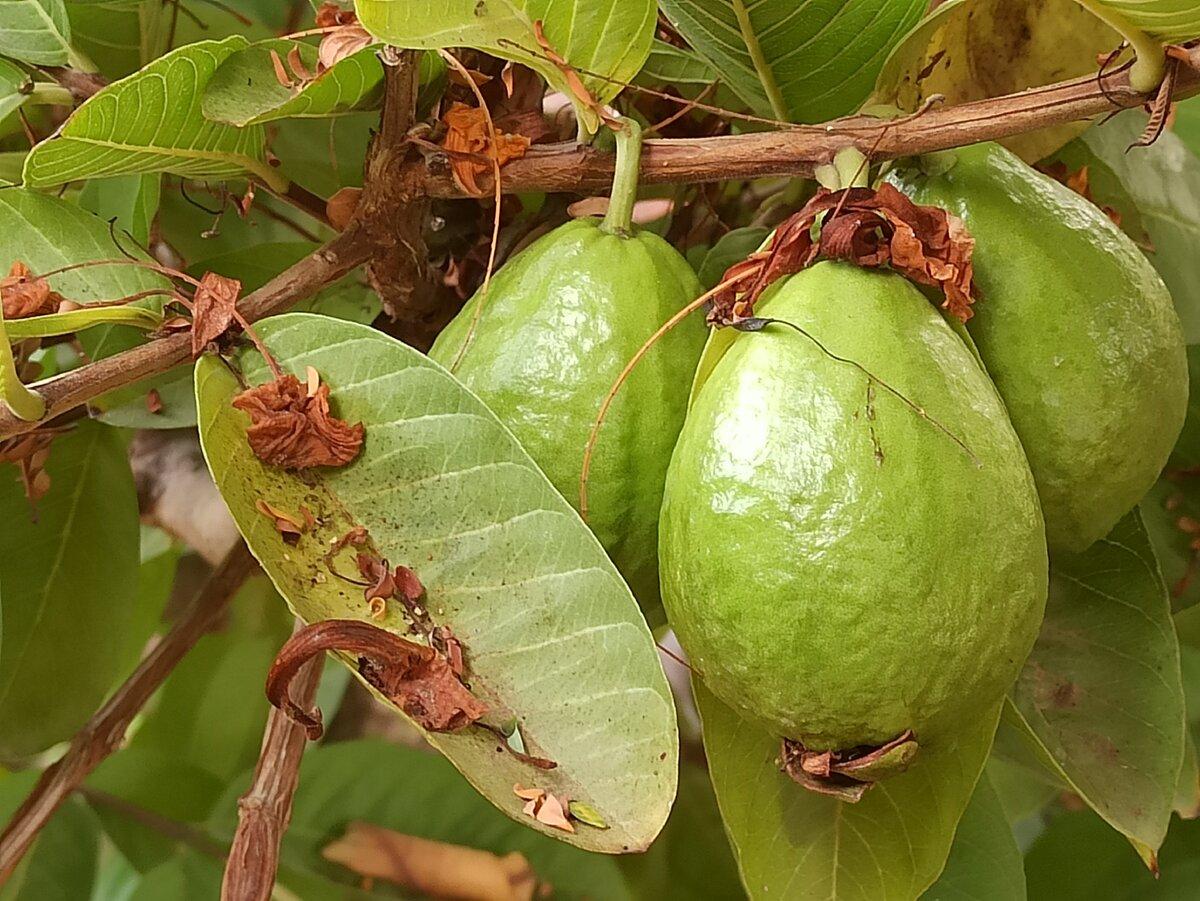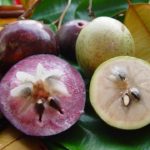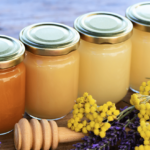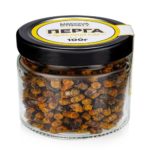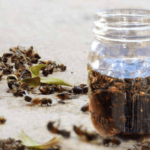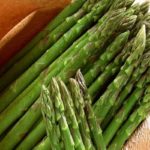Tropical guava is a fruit that has excellent taste and contains many valuable components. Thanks to this, the product produces a healing effect on the body and helps improve its functioning. The first trees with such fruits began to be grown in Central and South America. However, now the tropical apple has become widespread throughout the world.
Description of the fruit
Guava is a plant from the Myrtaceae family. It is an evergreen tree that reaches a height of 4 meters. Especially large plants grow up to 10 meters.The beautiful crown consists of spreading branches with dense, bright green foliage.
This plant is characterized by rather large leaves. They reach a length of 16 centimeters. The foliage has a shiny surface on top and is covered with light fluff underneath. The fruits can be round or pear-shaped. They are large in size and weigh 75-160 centimeters. The diameter of the fruit reaches 8-15 centimeters.
Sometimes the fruits are compared to lumpy apples. This is due to the presence of pimply skin. Visually it looks dense and rough. However, in reality, guava has a thin and elastic skin. Depending on the variety, it can be sweet or bitter. The color of the fruit depends on the type of tree and area of cultivation. It may be slightly greenish, yellow, or bright crimson.
Ripe fruits have a pleasant aroma. Inside is juicy and loose pulp, which has a sweet taste reminiscent of an apple. Its color depends on the variety and can be yellow, ruby, pink or red. Each berry contains up to 500 small and hard seeds. Green fruits have a sour taste.
The harvest can be harvested several times a year. First, the fruits ripen in the central part of the tree. Another 2-3 harvests are carried out later - that’s when the rest of the fruits ripen.
Chemical composition
The fresh product has minimal calorie content. 100 grams of fruit contains only 68 kilocalories. This product contains 2.6 grams of protein, 1 gram of fat and 9 grams of carbohydrates. The fruits are primarily composed of water. Thanks to this, they cope well with thirst. Guava also contains the following components:
- calcium;
- phosphorus;
- iron;
- vitamin A;
- fruit sugar;
- cellulose.
According to some studies, a tropical apple contains 5 times more vitamin C than an orange. Due to its balanced composition, the fruit helps strengthen the body’s natural defenses – especially in winter.
Ripe fruits must be eaten with the peel. It contains many vitamins and microelements. At the same time, the peel itself activates the functions of the digestive system, since it contains many enzymes.
Beneficial features
The medicinal properties of guava were known a hundred years ago. These fruits were used for medicinal purposes by residents of different regions - the Philippines, Brazil, and the West Indies. Thanks to the use of these fruits, the following results were achieved:
- Restore normal blood sugar levels. Thanks to the observations of scientists, it was possible to reveal that the leaf extract helps improve glucose parameters. The results studied showed good prospects for maintaining optimal sugar levels and insulin sensitivity. An experiment was also conducted among people, in which 19 people took part. All of them systematically consumed tea prepared from the leaves of the culture. Studies have shown that after drinking this drink, post-meal blood sugar dropped by at least 10%.
- Improve heart muscle health. Guava has a complex effect on it. Thus, researchers were able to prove that guava leaves contain many vitamins and antioxidants that protect the organ from the effects of free radicals. In addition, guava contains a lot of potassium and fiber. These ingredients help protect the myocardium. Studies have shown that the leaf extract of the plant reduces blood pressure and helps normalize cholesterol levels.
- Improve the functioning of the digestive organs.During the study of the composition of the fruits, it was possible to establish that they contain a lot of fiber. 1 fruit contains 12% of the daily volume of plant fiber. Eating guava helps relieve constipation and gently cleanse the intestines. The leaf extract of the plant produces a stimulating effect on the digestive organs. In addition, it has antibacterial properties. The active components suppress the development of pathogens in the intestines, which leads to diarrhea.
- Cope with tumor formations. The plant extract is able to protect cells from abnormal changes and stop the development of tumor cells. Researchers believe that the active components protect cells from the negative effects of free radicals, which lead to cancer.
- Stimulate the immune system. Lack of vitamin C is considered one of the important risk factors for the development of many pathologies, including infectious ones. The addition of guava provides the body with ascorbic acid, which stimulates the body's protective functions. One guava contains almost 2 times more of this component than oranges. Containing a large amount of vitamin C ensures strong immunity. In addition, the substance gives guava antibacterial properties. This helps protect the body from bacteria and viruses. It is important to consider that vitamin C quickly leaves the body, so you need to consume guava for medicinal purposes regularly.
- Eliminate constipation. Guava has mild laxative properties. This is due to the increased fiber content. If you eat at least one fruit every day, you will be able to get 12% of your daily dose of plant fiber. This makes the fruit beneficial for the intestines. Experts advise consuming guava seeds.They must be swallowed whole or chewed.
- Save vision. Guava is considered one of the best sources of vitamin A, which provides great benefits to the eyes. Therefore, the fruit can be consumed for the purpose of prevention and to improve visual acuity. Systematic use of the product slows down the development of cataracts. It also stops macular degeneration.
- Reduce toothache. Guava leaves contain anti-inflammatory and antibacterial components that help fight pathogens. Toothache is usually caused by an infection, which guava is an excellent remedy for. Home remedies based on guava leaves have analgesic properties, cope with swelling of the gums and eliminate ulcers of the oral mucosa.
- Achieve anti-stress effect. Guava contains large amounts of magnesium, which relaxes the nervous system and muscles. The fruits should be consumed during recovery from physical and mental stress. This product helps relax muscle tissue, eliminates stress and provides energy.
- Improve your brain health. This product normalizes cerebral circulation. This is facilitated by niacin and pyridoxine, which are better known as vitamins B3 and B6. These ingredients support cognitive performance at a high level and at the same time relax the nerves.
- Relieve cough and other symptoms of a cold. Due to the increased content of vitamin C and iron, guava becomes useful during epidemics of viral infections. To do this, you need to squeeze the juice from unripe fruits and make a decoction to reduce cough and eliminate cold symptoms. The active components of guava remove phlegm and cleanse the throat and respiratory organs of viruses and bacteria.
- Slow down the aging process.Guava contains substances that have anti-aging properties. This product includes vitamins A and C, lycopene and carotene. All these components are powerful antioxidants and protect the skin from the negative effects of internal and external factors. Due to the combined effect of the active ingredients, it is possible to prevent the formation of wrinkles.
Application
Guava is used in different areas of life. The fruits of the plant are actively used in cooking and cosmetology.
In cooking
Various dishes are prepared from guava. This exotic fruit contains a lot of pectin. The substance helps give liquids a jelly-like structure. Thanks to this, guava can be made into jelly or jam. This dish will be a good second breakfast option. It can also be used as a dessert after lunch.
Guava juice has strong antioxidant properties. It should be used as a good alternative to today's popular detox drinks. The fruit is also suitable for making purees or pastes. This ingredient will help give a standard dish an unusual taste. To dilute the sweetish-spicy notes, it is worth using other fruits, vegetables, and spices.
Guava can also be canned. It tastes a little like canned peaches. This product has a viscous and loose structure. In addition, it has an unusual taste and aroma.
This product can be used as a spice. To do this, you need to grind the guava pulp into flakes and cut off the zest from it. It is also permissible to grind the product to a powder and add it to your favorite dishes.
Guava is great for baking.The syrup from this fruit has a rather viscous texture. They can replace eggs when preparing desserts. In addition, the exotic fruit is well suited for raw foodists and vegetarians.
It is worth considering that this product is in perfect harmony with various types of meat. The combination with pork and venison is especially successful. At the same time, one of the most unusual options is the combination of guava with dairy products. Pieces of fruit can be added to low-fat cottage cheese. It is also acceptable to eat the whole fruit with a glass of fresh milk. This allows you to enjoy a pleasant taste and saturate your body with valuable substances.
In cosmetology
The exotic fruit also benefits the skin. This fruit can be used as the following substances:
- antiseptic;
- exfoliant;
- healing agent;
- astringent product;
- antioxidant.
It is also permissible to use guava extract and oil in cosmetology. Such remedies are used for skin rashes. With their help you will be able to get rid of acne. Also, these substances effectively eliminate post-acne.
This tropical fruit is an effective ingredient that prevents the formation of wrinkles. The product actively smoothes the dermis, makes its color more even and eliminates signs of aging. Leaf extract helps combat hyperpigmentation. Sometimes a course of 6-12 months is enough for the patient to eliminate spots on the skin without the use of a laser.
Contraindications
Experts do not classify the product as an aggressive exotic fruit. Usually its use is not accompanied by unpleasant symptoms. However, guava has a number of contraindications for consumption:
- Tendency to allergic reactions. To make sure that you are not intolerant to the product, you should smell a quarter of a guava.
- Pathologies of the kidneys and adrenal glands, urolithiasis. People with such diagnoses should not eat unripe fruits.
It is recommended to try a small amount of guava for the first time. Sometimes the human body reacts to it with dyspeptic disorders. Subsequently, you should also not eat a lot of fruits at one time. Excessive intake of active components into the body provokes the development of diarrhea.
It is important to consider that guava has very hard seeds. If you bite through them, you can damage the enamel. Therefore, the fruits must be consumed with extreme caution.
Guava is a healthy tropical fruit that contains many valuable components. It is actively used in cooking and cosmetology. In order for the fruits to give the desired results and not harm the body, it is important to follow the rules for their use.

